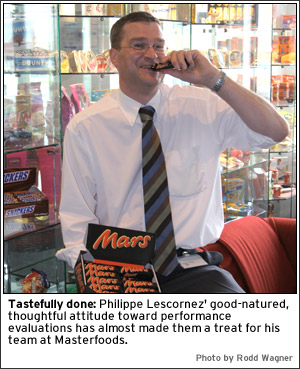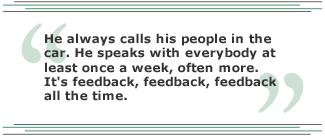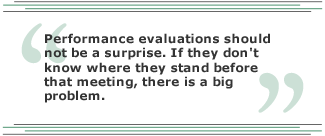No one on Philippe Lescornez' team of grocery sales specialists goes into a performance evaluation expecting any big news. If the manager has something important to say, he will just say it, rather than wait for a formal feedback session.
 |
While for other workgroups, the yearly or semi-annual appraisals can be anxiety-laden confrontations between an employee and a company's official representative, Lescornez approaches them as an opportunity to summarize and commit to paper hundreds of discussions that have occurred along the way.
The veteran manager's team scores him among the top 20% of supervisors worldwide on the Eleventh Element of Great Managing, which is measured by the statement: "In the last six months, someone at work has talked to me about my progress." (See sidebar "The 12 Elements of Great Managing.") Lescornez is considered one of the best mentors in his company and was recently recognized with its "Line Manager Excellence" award for Europe.
How could a manager who doesn't make a big deal of such a traditionally important responsibility be considered the epitome of a statement that many think has "performance appraisals" written all over it? It's because receiving regular, insightful, personal feedback -- rather than a boilerplate review -- is intensely powerful to workers. Lescornez understands the difference.
The importance of everyday discussions
While Lescornez' evaluations are more pro forma than formal, his everyday discussions with his team are challenging and invigorating. No one is left guessing how he or she is doing.
"The most important part (of discussing progress) was the informal part during the year, because [Lescornez] always kept us motivated," says former team member Hulya Hoke. "He was always giving us objectives and challenging us. He did it during the whole year and not only in the formal part of the evaluation -- not only on paper, but continuously." His investment in his employees' careers is the centerpiece of their high engagement and performance.
Lescornez and his team work for Masterfoods in Brussels. This division of Mars, Incorporated sells snacks, dog and cat food, and human staples such as grains and sauces under such familiar brands as Uncle Ben's rice, Snickers candy bars, Dove ice cream, and Pedigree dog food. The team of "sales promoters" is assigned to fan out across Belgium and Luxembourg, calling on grocery stores to ensure that Masterfoods products arrive on schedule and get enough prominence at the point of purchase. Product sales hinge on two factors: availability and visibility. Those hired are frequently young and ambitious. Sales promoters generally work alone and many kilometers from company headquarters, so the job requires strong personal motivation and can be isolating.
Unless, that is, one has a manager like Lescornez. "He always calls his people in the car. He speaks with everybody at least once a week, often more," says Karin De Backer, a Masterfoods trade services manager and Lescornez' supervisor. "When people move to his team, at the beginning, they need to adapt because he phones them all the time: 'How are things going? How are you? Everything okay?'" New hires sometimes complain, "He's always behind me," until they realize he calls because he cares. "It's feedback, feedback, feedback all the time," says De Backer.
Finding untapped potential
For Lescornez, one of the challenges of motivating his team is seeing the potential of each employee and deciding what progress would be most meaningful. Consider the case of Didier Brynaert.
Brynaert works in Luxembourg, 230 kilometers from Masterfoods' Belgium headquarters and, of course, a country away from his manager and the rest of the team. Brynaert was considered a good sales promoter who was doing what was generally expected in his role. Lescornez decided that Brynaert's job could be made more important if he were seen less as just another sales promoter and more as an expert on the unique features of the Luxembourg market.
"It's a small country that's very profitable. It has 5% of the population of Belgium, and it makes up 15% of Masterfoods Belgium's business," says Brynaert, who rattles off other observations about unemployment rates and consumer preferences. "The economic situation in Luxembourg two years ago was not so good. And now, after my experience here, the business is growing."
To help Brynaert progress, Lescornez asked him for information he could share with the home office. He hoped that by raising Brynaert's profile in Brussels, he could create in him a greater sense of ownership for his remote sales territory. "I started to communicate much more what he did to other people [within the company], because there's quite some distance between the Brussels office and the section he's working in. So I started to communicate, communicate, communicate. The more I communicated, the more he started to provide material," says Lescornez.
 |
As Brynaert received more recognition, he began to excel, fighting for more business and building large, high-quality displays of Masterfoods products in the grocery stores he serves. Account and marketing managers rely on him for expertise on the market. "Now he's recognized as the specialist for Luxembourg -- the guy who is able to build a strong relationship with the Luxembourg clients, where volumes and inventory turnover for the company are guaranteed and even still growing," says Lescornez.
Brynaert says the regular connection to his manager is crucial to his success and that he enjoys being able to phone Lescornez with a question or to relate an experience. "It's very important to me to have a good manager, because I like to work without supervision and with a lot of freedom," he says. "Philippe gives me a lot of freedom."
In sales promoter Ilse Van der Weeën, Lescornez saw great potential, but he also found her too stern and unapproachable, enough so that he thought those traits would handicap her progress. "It was probably the most important thing for her to improve," he says, "but it's not the easiest thing to do. How do you tell someone she has to smile more?"
After Lescornez got to know her well enough that he thought she might take the advice, he gave her his opinion. She accepted the criticism solely because she knew her manager was trying to help. "I wouldn't have accepted it from just anyone," she says, "but he was my line manager. He was the one who knew me best. And he had in mind good things for me."
Wendy Dekens has been a sales promoter for four years. She knows the job well. But for a number of reasons, a promotion does not seem imminent. She was at risk of stagnating, and she candidly acknowledged that her career track is uncertain.
"There was a certain comfort zone, some routine, coming," says her manager. Lescornez decided to capitalize on her expertise and her interest in training to make the job of a sales promoter more fulfilling and to give her a sense of progress. "I know my job, and I know it 100 percent," she says. "I would really like to share all this information with my colleagues. I love to explain things. I love to give training."
Lescornez asked Dekens to prepare a manual that could be given to new hires, who are likely to be assigned to ride along with her in their first weeks on the job. She "took with both hands" the chance to create the manual. "It made my job more attractive, innovative, and interesting than the job that I know through-and-through." Where it will lead, she doesn't know, but her manager's creativity sparked greater engagement than if she were left to do just the job of a sales promoter.
Hoke is known for her exuberance and extroversion. "The energy I may have taken from my culture," she says. "I come from Turkey, and maybe people there are more open." Her clients loved her because of the excitement she brought along. "She was very, very respected by her clients," says Lescornez. "It was always a very amusing day to go with her into the field to see her clients."
Her greatest talent was also a liability, however. Hoke brought such energy to the job that she was also susceptible to going in too many directions at once, spreading herself too thin. "I saw the potential and the drive she had," says her manager. "It was in a rather unstructured way. She was doing plenty of things with big doses of energy, but her balance wasn't that strong."
Lescornez needed to help her focus without diminishing her natural enthusiasm. He did so first by spending plenty of time riding along with her to visit her clients, then by praising her abilities enough that she felt comfortable taking direction from him.
"We spent a lot of time together in the field, a lot of discussions, a lot of talks," says Lescornez. "I always made it possible that she could take risks and speak freely." The manager says he discovered that if he spends enough time with his team members helping them, talking and joking, they will invite feedback, asking him what they can do to improve. This is when an employee is most receptive to coaching.
 |
After calling on one grocery store with Hoke to discuss the visibility of Masterfoods' products, Lescornez shared his thoughts about how the visit had gone. He made sure he began by praising what she had done well. "Praise is very important," he says. "Once you get people on a positive track, you can tell more and more things to them. You have to praise people. You have to talk in a positive way, and then you can redirect things that need to be redirected."
Lescornez felt that for all her positive emotional connection with the customer, Hoke meandered, "jumping from the left to the right," during the negotiation. He told her she might want to spend more time preparing for the meeting, introducing more facts and figures and relying less on personal rapport. "He is a funny man, and so the way to explain things was also wonderful. He has an ease in the way he explains things," says Hoke.
She took his counsel to heart, improved quickly, and was selected soon thereafter to expand her abilities by working in the vending part of the business. Turnover is an issue for Lescornez' team -- not because team members quit, but because they get tapped for new responsibilities. In his 18 years as a manager, Lescornez estimates, he has managed 125 sales promoters ("I've seen some characters," he adds), 60% of whom eventually were promoted.
"He makes you think harder"
It's not unusual for each person on Lescornez' team to feel like he or she receives special attention, says De Backer. In fact, he does that for everyone. "If I do my job well, it's thanks to Philippe, because he taught us to set priorities," says Hoke. "We have lots of things to do. You can't [do] everything at the same time," she says, preaching the message her manager taught her. "We have to say, okay, this is a job; we have to do A, B, C, D, E, and so on. But you have to begin with the A."
Mieke Demeyer hasn't reported to Lescornez for more than a year-and-a-half, but was among those who recommended him for his award because of his patience and knack for helping people participate in solving the problems they presented to him. "He makes you think harder, just trying to get to the next step yourself, being a coach, standing on the sideline, but doing the thinking with you," she says.
A typical coaching session is prompted by a sales promoter calling Lescornez when he or she is "stuck," not knowing what to propose in negotiating for display space. The manager begins by reviewing the situation. He is, by all accounts, a patient and careful listener. "He would try to make you think what could be the options and not give the answer right away," says Demeyer. If the employee needs a little help, he'll drop a hint or two. That's usually enough, she says, "Then you could build upon that, and it was fantastic, because he took the time to really build up a new solution, and you had the feeling that, 'Yeah, I came to a solution myself!'"
The hallmark of Lescornez' leadership is the responsibility he gives his team and how he makes them struggle a bit in finding answers. "He could do it quickly, so it's easy and it's done," says De Backer, his manager. "He never does that. He always challenges back and says, 'What would you do?' He gives them a lot of trust. They learn by committing mistakes, and then he coaches them. He's always there to look after them, but he will not do it for them."
Soon after De Backer assumed responsibility for Lescornez and his team, she commented that the sales promoters' fact books were insufficient. Lescornez told everyone to bring their fact books with them to the next meeting. De Backer assumed he would have them leaf through the manuals and examine them for the required pages in a fairly authoritarian fashion.
Instead, he asked the employees to pair up, review their colleague's book, and present to the group the good points of that book. "At the end, they had tremendous ideas to improve their fact books," she says. "It was done in a very positive, constructive way. Everybody learned something good from another person. It was a simple thing, but for me it was a great example of how you should do it."
 |
Lescornez' approach certainly took longer, but it yielded more. De Backer anticipates that the sales promoters will do more with the material in their fact books than if their boss dictated the contents to them. But she doubts that Lescornez ever considered the alternative. "I'm sure Philippe never did it any other way."
"He's an inspiring person," says former sales promoter Dieter Van den Brande. "He's funny. He's informal. He makes you challenge yourself."
In his 18 years of managing at Masterfoods (he is so much a company man that his dog is trained to reject a competitor's bone in favor of the Pedigree-brand bone his team markets), Lescornez has built a reputation as someone who will work to accelerate the careers of his people. "He is the one you want to work for," says Van den Brande.
"Evaluations should not be a surprise"
With so much direct coaching, there isn't much drama left for the formal evaluations, which are required at Masterfoods just as they are at many companies. "The formal paper part of it was more like, 'Okay, now we have to do the paper part. We're going to do it together and fill it out, and then you can tell me if you are all right with what I've written down,'" says Demeyer.
"There was no surprise," says Hoke. "It was very, very easy to do because it was exactly what we had done during the year."
"Performance evaluations should not be a surprise," says Lescornez. "If they don't know where they stand before that meeting, there is a big problem. One of the two hasn't been doing his job -- probably the manager."
Van der Weeën says she appreciates Lescornez' ability to understand each person's individual strengths and weaknesses and to ultimately determine the needs of the person he is coaching. "I don't think any of us want to feel [like] I am just a machine being told to 'Sell, sell, sell!' I am a person -- not always perfect," she says.
One of the first things that came to mind when De Backer was asked about Lescornez was a conversation she had with him about a manager's responsibility for an employee's progress. "People often judge other people quickly," she says. "We tend to do that at Masterfoods. But he always says if somebody is not good, you should question yourself as a boss and ask, 'What did I do to improve, to coach, the person, to help him, to teach him?' Always be sure that you did everything that you could."
 |